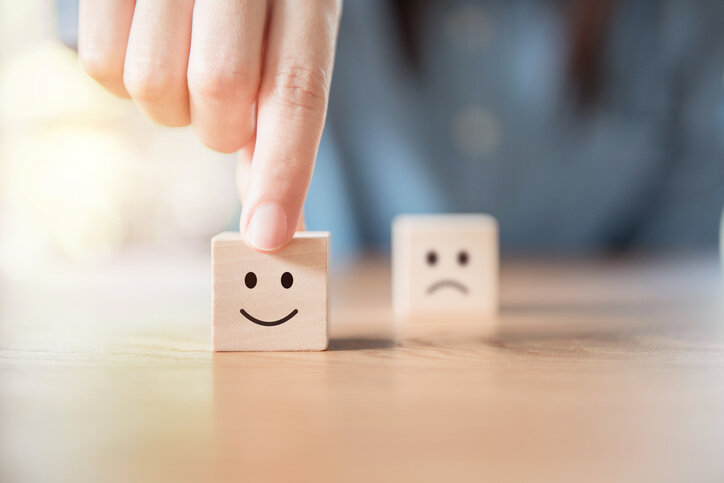Maintaining an excessive positive attitude can be harmful to our health, as well as affect our interpersonal relationships.
On social media, it is common to see people saying that everybody has to have a “positive attitude” during the pandemic. And while it is necessary to be optimistic, it is impossible always to maintain a positive attitude. Only focusing on the positive is not as good as it seems; it can even become “toxic.”
Samara Quintero and Jamie Long, American psychologists, define toxic positivity as “the excessive and ineffective over-generalization of a happy and optimistic state in all situations. The process of toxic positivity results in the denial, minimalization, and invalidation of the authentic human emotional experience.”
Quintero and Long explain that being positive all the time becomes negative when this attitude is used to suppress emotions such as resentment, sadness, or anger. Psychologist Konstantin Lukin delves into this point, stating that denying negative emotions can make people enter a cycle where these emotions grow because they are not processed until the situation becomes unbearable. Dr. Lukin explains that emotions are data that inform us what is happening at this moment, but they do not tell us how to act or react. Denying emotions also harm interpersonal relationships. Regarding the COVID-19 pandemic, if a person has anxiety and fear, seeing messages like “everything will be fine,” “it’s no big deal,” or similar expressions can cause them to walk away, appearing inaccessible emotionally or stuffing their emotions. “Imagine trying to have a meaningful relationship with someone who ignores sadness or anxiety,” Lukin says.
Signs of toxic positivism
Samara Quintero and Jamie Long present some common signs of toxic positivity:
-
Hiding or masking true feelings.
-
Pretending that everything is okay.
-
Feeling guilty of their negative emotions for not being “positive.”
-
Minimizing other people’s experiences with phrases like, “everything will be fine,” “you have to be positive,” or the like.
-
Comforting someone else by giving them perspectives, saying things like, “It could be worse,” rather than validating their emotions or experiences.
-
Attacking, humiliating, or punishing someone for expressing frustration, anxiety, sadness, or anything other than positivity.
-
Ignoring feelings, saying things like, “That’s the way it goes.”
Why is toxic positivity harmful?
It causes shame
According to psychologists, shame is a crippler because it is one of the most uncomfortable feelings. Expecting someone to be always well or have a positive outlook all the time can cause the other to remain silent about what they are feeling, out of shame. Plus, it can make other people feel like a burden and that they have to pretend that everything is okay rather than being honest.
It suppresses other emotions
Over the years, there have been several studies about the effects of suppressing “negative” emotions, such as those conducted in 1987, 1997, 2010, and 2018. These studies show that denying feelings or hiding them can produce stress as well as prevent someone from developing the tools to control distressing emotions or thoughts. “If you are angry, and your feelings of anger are not recognized, they become buried deep in your bodies. Repressed emotions can later manifest as anxiety, depression, or even physical illness,” Drs. Quintero and Long write.
Also, these studies have shown that it is essential to have facial expressions, such as crying, to describe how one is feeling and help regulate the response to stress. A 1997 study, for example, showed that participants who were asked to pretend to be okay after watching disturbing videos were bursting with tension inside, compared to those who demonstrated how they felt. The authors also mentioned that suppressing emotions can lead people to create a false personality by not wanting to show a part of themselves. To hide in that way, according to Quintero and Long, is to deny the truth, which is that life hurts and is not easy. Feeling emotions helps to verbalize them and remove them from the body, helping it to stay healthy and stress-free.
It produces isolation
Creating a false personality can lead to a loss of connection with oneself and with others. The authors describe it as follows: “Have you ever been close to a sugary, pretty person who “only thinks happy thoughts”? How comfortable do you feel when talking about your deep emotions? Although that person might have the best intentions in the world, the message she is sending inadvertently is, ‘Only good feelings are allowed in my presence.'” This kind of attitude only causes others to see us as someone inaccessible because only a positive person can be by our side. This can even cause isolation.
How to avoid toxic positivism?
It is necessary to accept emotions as information or as a helpful guide to avoid thinking that emotions are negative since that connotes an automatic rejection. As the author Karla McLaren explains, “treating emotions as negative or positive always leads to what my computer programming friends call the GIGO (Garbage in, Garbage out) problem. If you enter an incorrect string of code into your program, the program will not work, or it will do something overly complicated. “Garbage in, garbage out.”
Accepting that these emotions exist will help to overcome them and decrease their intensity. Lukin describes it as taking a weight off, because, in addition to being able to process the emotions, we can be more open with our loved ones and talk about how we feel, rather than always pretending that everything is okay. Besides, emotions help convey information to others. For example, if we are currently nervous about the quarantine, talking to someone else about it can help us find comfort or support, rather than rejection.
Being positive is not a bad thing. It is good to try to see the positive side of things, more in these times of COVID-19. Still, it is equally important to learn to listen to what information our emotions want to convey and recognize them, even if they are negative. To stop trying to be always positive and learn to process feelings will help us better understand ourselves and others.
This article from Observatory of the Institute for the Future of Education may be shared under the terms of the license CC BY-NC-SA 4.0 
)
)


)